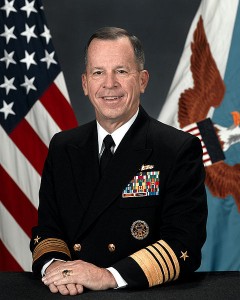Pakistan Issues New Warning to US; Mullen Accusations Softened
There are new developments this morning in the latest war of words between the US and Pakistan. Pakistan’s Express Tribune reports that an official familiar with what transpired claims that the head of Pakistan’s ISI informed CIA chief David Petraeus last week that should the US take unilateral military action against the Haqqani network in Pakistan, then Pakistan “will be forced to retaliate”. At the same time, anonymous sources are telling the Washington Post that Joint Chiefs Chair Michael Mullen’s remarks last week to the Senate Armed Services Committee were “overstated”. That is especially significant since the Express Tribune article notes that Mullen’s remarks played a role in the ISI getting to the point of issuing its warning to the CIA.
From the Express Tribune:
The effort to ensure that diplomacy and calmer heads prevail at a time of fragile relations between Pakistan and the United States is on. However, the effort notwithstanding, Islamabad has made it clear to Washington that, if it comes down to it, Pakistan will be forced to retaliate if American forces attempt to launch a unilateral strike on the country’s tribal belt.
The message was personally delivered by Inter-Services Intelligence agency (ISI) Chief Lt General Ahmed Shuja Pasha to Central Intelligence Agency (CIA) chief General David Petraeus during his recent trip to Washington, said an official familiar with the development.
The official, who spoke on condition of anonymity, told The Express Tribune that Pasha had informed his counterpart that the Pakistani people will not tolerate any US misadventure and in that case the government will be left with no other option but to retaliate.
Senior ISI members, the official said, had felt ‘betrayed’ by the blunt assessment of the US Chairman Joint Chiefs of Staff Admiral Mike Mullen that the spy agency had links with the Afghan Taliban-allied Haqqani network. In a stinging remark, Mullen accused ISI of supporting one of the most feared Afghan insurgent groups to target US forces stationed in Afghanistan.
The article goes on to point out that numerous high level meetings between US and Pakistani officials continue.
Meanwhile, back in the US:
Adm. Mike Mullen’s assertion last week that an anti-American insurgent group in Afghanistan is a “veritable arm” of Pakistan’s spy service was overstated and contributed to overheated reactions in Pakistan and misperceptions in Washington, according to American officials involved in U.S. policy in the region.
The internal criticism by the officials, who spoke on the condition of anonymity because they did not want to challenge Mullen openly, reflects concern over the accuracy of Mullen’s characterizations at a time when Obama administration officials have been frustrated in their efforts to persuade Pakistan to break its ties to Afghan insurgent groups.
It turns out that the primary evidence linking the US Embassy attack and the Haqqani network is not as clear-cut as some in Washington were claiming. Although Mullen claims to have been unaware of the cell phone evidence when he made his remarks, cell phones found on some of the attackers are widely cited as evidence of close Haqqani network-ISI coordination in the attack:
One official said the phones were used to make repeated calls to numbers associated with the Haqqani network, as well as presumed “ISI operatives.” But the official declined to explain the basis for that conclusion.
The senior Pentagon official treated the assertion with skepticism, saying the term “operatives” covers a wide range of supposed associates of the ISI. “Does it mean the same Haqqani numbers [also found in the phones], or is it actually uniformed officers” of Pakistan’s spy service?
There will undoubtedly be several more twists and turns to this story over the next few weeks, but for now it appears that the US is making a small effort to walk back its most incendiary comments while Pakistan is digging in more firmly on its position.

